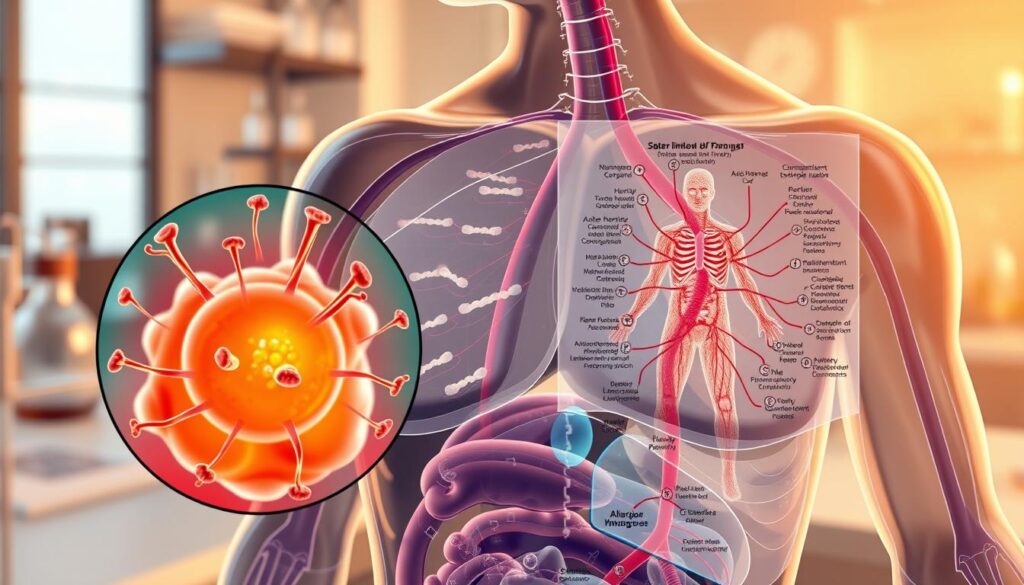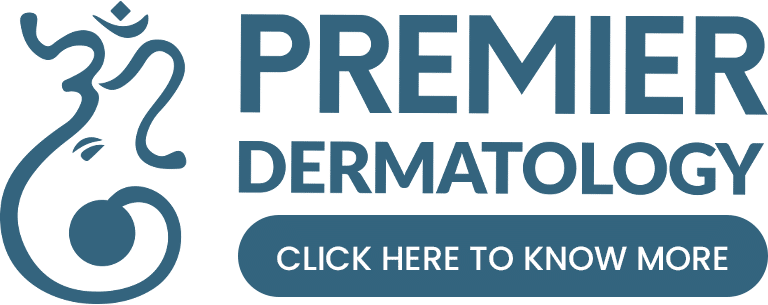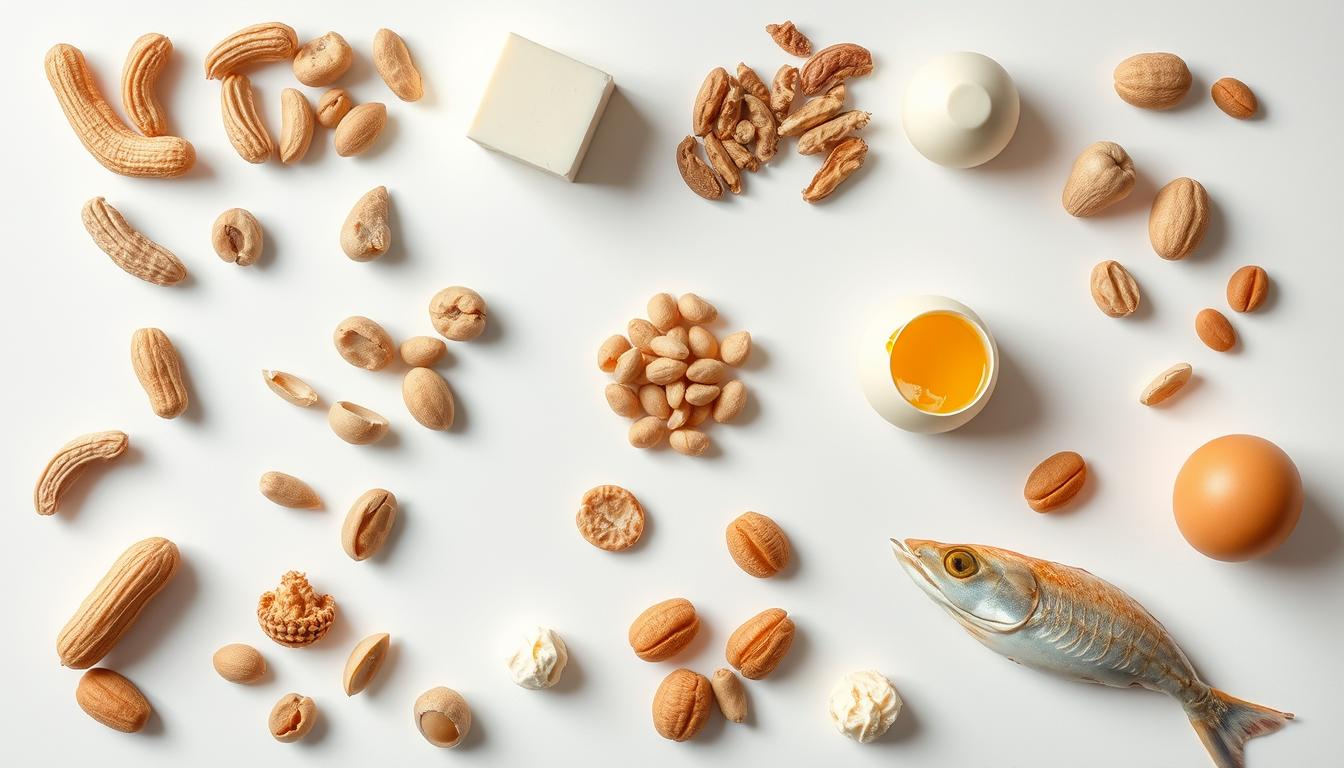Imagine planning for weeks to find out what’s causing your allergies. Then, you realize a snack from the day before might have messed up your results. At our clinic, we know how important it is to get clear answers.
That’s why it’s key to know which foods to avoid before allergy testing. A simple snack like an apple or a cup of coffee could affect your test’s accuracy. This could delay finding relief from your allergies.
Your allergy testing diet is critical. It helps make sure your test results show what you’re really allergic to, not something else.
Foods like apples, melons, or bananas can lead to false positives because of cross-reactivity. Caffeine might also hide symptoms. Every food choice you make before testing can affect your diagnosis.
By following these guidelines, you help your healthcare team find the right triggers. They can then create a treatment plan just for you.
Key Takeaways
- Apples, melons, and bananas may cause misleading results due to cross-reactivity.
- Discontinue caffeine 24 hours before testing to avoid symptom masking.
- Antihistamines like Claritin must be stopped 7 days prior.
- An accurate allergy testing diet ensures reliable diagnosis and effective treatment.
- Contact us at 601-984-5160 with questions about your pre-test requirements.
Understanding Allergy Testing
Allergy testing is key to finding out what causes immune reactions. It’s different from food intolerance testing, which deals with digestion problems. These tests look for antibodies linked to serious reactions. They help doctors create a treatment plan and prevent allergic reaction prevention.
What is Allergy Testing?
Tests like skin pricks or blood tests find out what allergens cause symptoms. A skin prick test uses 10–50 allergens on the skin. Results show up in 15–30 minutes. A raised bump means you’re sensitive, but the size doesn’t show how severe the reaction will be.
Blood tests check for IgE antibodies and take 1–2 weeks. Oral food challenges confirm diagnoses and are done under a doctor’s watch.
Why is Testing Important?
Getting a correct diagnosis is vital to avoid serious problems. Over 5.2 million U.S. kids have hay fever, showing the need for tailored care. Testing finds hidden allergens, helping you avoid them and prepare for emergencies.
Early treatment lowers the risk of anaphylaxis and improves life quality.
Types of Allergy Tests
- Skin Prick Test: Quick results, minimal discomfort, ideal for initial screening.
- Blood Tests (IgE): Used when skin tests aren’t feasible, though higher false positives require cautious interpretation.
- Oral Food Challenge: The gold standard, but conducted in-office due to anaphylaxis risk. Emergency meds must be available.
Choosing the right test depends on symptoms and medical history. Our specialists help patients pick the best option for safe, accurate results.
Preparing for Allergy Testing
Getting ready right can make your test accurate and smooth. Skipping steps like adjusting meds or planning a pre-allergy test meal plan can mess up your test. Here’s what you need to know to make your visit go well.
Importance of Pre-Test Preparation
Stop taking antihistamines for 5–7 days before your test to get accurate results. Tell your doctor about all meds, including eye drops or skin creams. A good allergen-free meal prep keeps you nourished and safe from allergens.
Our team suggests making a pre-allergy test meal plan to avoid common allergens like dairy or nuts.
“Bring a complete list of medications, including supplements and herbal remedies, to your appointment. This helps us avoid testing errors.” — Allergy Care Team, Boston Children’s Hospital
How to Schedule an Appointment
Here’s how to book your spot:
- Call our office at least two weeks in advance to get your preferred date.
- Have your insurance info, symptom history, and medication lists ready for intake forms.
- Check with your provider about any test-specific requirements, like stopping certain meds, when you book.
Arrive 10–15 minutes early for regular visits, and 30–45 minutes early for special tests. Showing up late might mean you have to reschedule.
Tell your provider about any diet changes, including your pre-allergy test meal plan. This ensures your safety and the test’s accuracy.
Foods to Avoid Before Testing
Getting ready right is key for good results. Stay away from these foods to avoid before allergy testing. Follow our recommended diet for allergy testing for the best results.
Common Allergens to Steer Clear Of
- Fruits and Vegetables: Apples, cherries, melons, cucumbers, and bananas may cause cross-reactivity.
- Dairy: Milk, cheese, yogurt, and cream should be eliminated 72 hours prior.
- Nuts and Seeds: Peanuts, tree nuts, and seeds must be avoided for at least 48 hours.
Duration for Avoiding Specific Foods
| Allergen Group | Examples | Avoid For |
|---|---|---|
| Seafood | Shellfish, fish | 72 hours |
| Grains | Wheat, barley, rye | 48 hours |
| Citrus Fruits | Oranges, lemons | 24 hours |
Hydration and Food Intake
Drink only water—skip caffeine and alcohol 12 hours before. Eat a simple meal like rice or chicken broth 2 hours before to avoid any issues.
Dairy Products to Avoid
When getting ready for allergy testing, it’s important to watch what you eat. Dairy proteins like casein and whey can mess up your test results. Here’s how to stick to an allergy testing diet and prepare allergen-free meal prep safely.
Milk and Cheese
Avoid cow’s, goat’s, and sheep’s milk for 7-10 days before your test. Hard cheeses like cheddar and soft cheeses like mozzarella contain allergens. Also, check for casein or whey in foods like boxed sauces or protein bars.
Yogurt and Cream
Even fermented products like Greek yogurt or kefir are off-limits. Cream-based items like sour cream and whipped cream might have trace milk proteins. Use coconut or soy-based alternatives during the prep period.
Butter and Ice Cream
Butter has milk solids, and ice cream has dairy bases. Use clarified butter (ghee) or plant-based spreads. For ice cream, choose sorbets made with coconut milk or almond milk instead.
| Dairy Product | Risk Factors | Alternatives |
|---|---|---|
| Milk | Casein/whey proteins | Almond, oat, or soy milk |
| Cheese | Allergens in aged cheeses | Nut-based cheeses |
| Ice Cream | Dairy milk base | Coconut or coconut milk-based desserts |
Our team suggests avoiding these items 7-10 days before your test. Need help? Contact us for personalized allergen-free meal prep advice. Using dairy alternatives keeps your diet balanced and ensures accurate test results.
Nuts and Seeds Restrictions
Before getting tested for allergies, it’s important to avoid nuts and seeds. This helps get accurate results and prevents allergic reactions. Peanuts, tree nuts, and seeds like sunflower or pumpkin should be avoided for at least two weeks before testing. Even a small amount of exposure can affect the test results.
Peanuts and Tree Nuts
Peanuts are actually legumes, but their proteins are similar to those in tree nuts like almonds or walnuts. Research shows that 20–30% of people allergic to peanuts also react to tree nuts. It’s common for foods to be contaminated with nuts, so always check labels for warnings.
Sunflower and Pumpkin Seeds
Sunflower and pumpkin seeds should also be avoided because they share proteins with nuts. Sesame seeds can also be a problem for 10% of people allergic to nuts. Schools often ban these items to keep environments safe for everyone.
- Avoid baked goods, trail mixes, and sauces where nuts/seeds may hide.
- Choose allergy-friendly food choices like oats, quinoa, or coconut flakes as substitutes.
- Read labels for oils—highly refined peanut oils are safer than cold-pressed versions.
Our team suggests carrying two-epinephrine auto-injectors when eating out. This is because cross-contamination is common in foods like Thai or Middle Eastern dishes. Staying informed helps keep you safe without giving up on good food.
Seafood and Fish Precautions
Before allergy testing, it’s important to avoid seafood and fish. This ensures accurate results. Seafood allergies are common, affecting almost 1% of Americans. They can cause mild to severe reactions.
Shellfish to Eliminate
Crustaceans like shrimp, crab, and lobster are high-risk due to strong allergens. Mollusks, including oysters, clams, and scallops, must also be avoided. The FDA requires clear labeling, but kitchen cross-contact is a worry.
foods to avoid before allergy testing include processed items like imitation crab meat. These often contain real shellfish proteins.
- Crustaceans: Shrimp, crab, lobster
- Mollusks: Oysters, clams, mussels
- Hidden sources: Imitation crab, seafood flavorings
Avoiding Fish Prior to Testing
Fin fish like salmon, cod, and tuna should be avoided for 2–4 weeks. Even small amounts in sauces or supplements can affect results. Allergists suggest avoiding all fish proteins, as 40% of those allergic to fish also react to shellfish.
Restaurants often have cross-contamination, so eating out can be risky.
- Common fish: Salmon, cod, mackerel, tilapia
- Hidden risks: Fish sauces, omega-3 supplements
- Safe alternatives: Plant-based proteins like tofu or lentils
For accurate testing, avoid these foods for at least two weeks. Always check labels and tell chefs about your diet. We recommend carrying epinephrine auto-injectors during this time.
Fruits and Vegetables to Consider
When you’re getting ready for allergy testing, some fruits and veggies might mess with the results. Oranges and grapefruits, for example, can make tests show false positives because of their compounds. Tomatoes and peppers might also cause problems because of their alkaloids. Our recommended diet for allergy testing suggests skipping these foods for 1–2 weeks before your test.
- Citrus fruits: Oranges, lemons, limes, grapefruits
- Nightshades: Tomatoes, peppers, eggplants, potatoes
- High-risk fruits: Apples, bananas, melons, cucumbers
Citrus Fruits and Cross-Reactivity
Eating citrus can lead to oral allergy syndrome, making your mouth tingle. This can mess up your skin prick test results. To avoid this, don’t eat citrus 10–14 days before your test.
Nightshade Vegetables
Nightshades have solanine, which can irritate your skin during tests. Swap tomatoes for leafy greens and peppers with carrots or squash in your pre-allergy test meal plan.
| Food Group | Risks | Alternatives |
|---|---|---|
| Citrus | Cross-reactivity | Pineapple, berries |
| Nightshades | Solanine irritation | Zucchini, green beans |
A good recommended diet for allergy testing includes foods like cooked carrots, peas, and non-citrus fruits. Always talk to a specialist before changing your diet.
Grains and Legumes Concerns
When getting ready for food intolerance testing, grains and legumes need extra care. Wheat and gluten can make allergy tests tricky. Wheat allergies mean avoiding wheat completely, while celiac disease has its own testing rules. Common culprits include bread, pasta, and soy sauce. The FDA notes that bakery items are often recalled for hidden allergens.
- Wheat-based foods: bread, cereals, soups
- Hidden gluten: soy sauce, processed meats
- Soybeans and peanuts (legumes with high cross-reactivity)
Wheat and Gluten Products
Start by avoiding wheat for 2-4 weeks before testing. Allergen-free meal prep might use rice or quinoa instead. But, check out the ASCIA EoE diet for a detailed plan. Celiac disease tests blood for antibodies, not skin tests used for allergies.
Beans and Lentils
Legumes like chickpeas and lentils might cause reactions. Soybeans are common in processed foods and can be risky. About 5% of people allergic to legumes react to several types. Safe choices include navy beans or black-eyed peas. Always check labels for soy in snacks or sauces.
Planning meals means knowing about cross-contact risks. For example, even “dairy-free” dark chocolate might have milk. Use gluten-free grains to avoid false positives in tests. Always get help from experts to follow elimination diets correctly.
Understanding Cross-Reactivity
Cross-reactivity is key in making allergy tests accurate and preventing allergic reactions. It happens when our immune system gets confused by similar proteins in different foods. This leads to false positives in food intolerance tests.

What is Cross-Reactivity?
Allergens in foods like apples, melons, and nuts share proteins with pollen or other allergens. This can cause immune responses, even if there’s no real allergy. For instance, 92% of those allergic to cow’s milk also react to goat’s milk in tests.
Clinical symptoms might not match test results. So, it’s important to have allergists interpret these findings.
Foods That Can Cause False Positives
- Milk: 92% cross-reactivity between cow’s milk and goat/sheep milk
- Nuts: 20–30% of peanut-allergic individuals test positive for tree nuts without actual symptoms
- Fruits: Banana, avocado, and kiwi often cross-react with latex allergens
- Seafood: 50% of fish allergies cross-react with related species
Tests might show false positives for foods like celery or carrots due to birch pollen exposure. Up to 60% of pollen allergy sufferers face oral symptoms from cross-reactive produce. Our experts suggest talking to your allergist about your pollen allergies before testing to avoid misinterpretations.
Consult your healthcare provider to make sure test results match your real-world tolerance. This ensures food intolerance testing shows true allergies, not just protein similarities. Proper preparation helps avoid unnecessary dietary restrictions and makes challenges safer.
Avoiding Medications
Getting ready for allergy tests means changing your meds first. Some drugs can mess with the results. So, it’s key to follow these tips for accurate tests.
Over-the-Counter Medications to Avoid
Stop using these meds at least 7 days before your test:
- Antihistamines: Claritin, Zyrtec, Allegra, Benadryl (diphenhydramine), and others
- Cold/flu medicines: DayQuil, NyQuil, or Tylenol PM with antihistamines
- Reflux meds (Axid®, Pepcid®, Tagamet®, Zantac®) need to stop 48 hours before
Prescription Medications and Allergies
Some prescription drugs need a doctor’s watch:
- Tricyclic antidepressants might change test results but shouldn’t be stopped without a doctor’s okay
- Oral steroids need a doctor’s advice; inhaled steroids are okay to keep using
“Never stop antidepressants or blood pressure meds without talking to your doctor,” says Dr. Emily Carter, an allergy expert.
Here’s how to get ready:
- Stop antihistamines 7 days before your test
- Pause reflux meds 2 days before
- Always talk to your doctor about changing your meds
When changing meds, plan a pre-allergy test meal plan that skips allergens and keeps you healthy. Choose allergy-friendly foods like rice, chicken, or veggies to stay nourished. Our team can craft a meal plan that fits your diet and health needs.
Specific Dietary Patterns to Consider
Before allergy testing, it’s key to plan if you follow a vegetarian, vegan, or gluten-free diet. We help you make adjustments to keep your health in check while getting accurate results. Here’s how to meet your dietary needs and testing requirements:
Vegetarian and Vegan Diets
Plant-based diets often include soy, nuts, and legumes, which are common allergens. For now, skip these and try foods like quinoa, rice, or sunflower seed butter. Here are some meal ideas:
- Quinoa salad with roasted veggies
- Rice and lentil soups (if lentils aren’t being tested)
Gluten-Free Diets
If you’re testing for a wheat allergy, your doctor might suggest eating gluten again. Stick to gluten-free grains like rice, corn, or certified oats. Make sure to avoid any gluten cross-contamination.
For diets like keto or Mediterranean, choose proteins that aren’t likely to cause an allergy, like fish or poultry. Stay away from high-risk foods like shellfish or nuts during the test. Always:
- Map out meals with your allergist first
- Use alternatives to common allergens in your diet
“Collaborate with your provider to tailor a recommended diet for allergy testing. Never adjust medications or stop antihistamines without guidance,” advises Dr. Emily Carter, board-certified allergist.
Remember, 90% of food allergies come from the top 8 allergens. Using substitutes like seed-based milks or buckwheat pasta can help. Tell your healthcare team about all your dietary restrictions to ensure safe and accurate testing.
When to Consult a Specialist

Not sure if your symptoms need a doctor’s check-up? Knowing when to get help is key. Our team helps figure out if you have an allergy or intolerance. This way, we can give you the right care.
Signs You Need Allergy Testing
Get checked if you notice:
- Swelling of lips/tongue after eating
- Wheezing or trouble breathing soon after exposure
- Stomach pain that keeps coming back with certain foods
- Rashes or itching that don’t go away after eating
- A family history of serious allergic reactions
How We Can Help
We start with a detailed check to find out what’s causing your symptoms. We use food intolerance testing and allergy tests that are backed by science:
- We look at your medical history to spot any risks
- Skin prick tests help us find out what you’re allergic to fast
- We create a plan to help you avoid things that make you sick
- After the test, we talk about how to manage your symptoms
| Condition | Allergy Symptoms | Intolerance Symptoms |
|---|---|---|
| Onset Time | Minutes to 2 hours | Hours to days |
| System Affected | Immune system reaction | Digestive system disruption |
| Testing Methods | Skin prick, blood IgE testing | Elimination diets, hydrogen breath tests |
Our experts make plans just for you. We use strategies like avoiding certain foods and emergency plans. Starting early treatment can make a big difference in your health.
Locations for Allergy Testing in Florida
Our Florida clinics make it easy to get allergy testing and advice on allergy testing diets and allergen-free meal prep. With many locations in Central Florida, you get personal help for your needs.
| Location | Address | Phone | Hours |
|---|---|---|---|
| Orange City | 938 Saxon Blvd Suite D, Orange City, FL 32763 | (352) 259-2159 | 8:30 AM – 5:00 PM |
| Orlando-Semoran Blvd | 1277 N Semoran Blvd Suite #102, Orlando, FL 32807 | (352) 259-2159 | 8:30 AM – 5:00 PM |
| St. Cloud | 4589 Henry C Yates Ln, St Cloud, FL 34769 | (352) 259-2159 | 8:30 AM – 5:00 PM |
Orange City Location Details
Find us at 938 Saxon Blvd Suite D. Free parking is available. We’re near Saxon Crossing Plaza. Our team helps with allergy testing diet and allergen-free meal prep.
Orlando – Semoran Blvd. Location
Our Orlando-Semoran Blvd. center is at 1277 N Semoran Blvd Suite #102. There’s accessible parking. Our specialists help with allergen-free meal prep for accurate testing.
St. Cloud Location Information
At our St. Cloud office, 4589 Henry C Yates Ln, we guide you on allergy testing diets. Parking is behind the building.
Contact and Scheduling Details
Ready to schedule your allergy testing? Our team is here to help. Call us at (352) 259-2159 to book an appointment or ask questions about foods to avoid before allergy testing. We’ll make sure your visit goes smoothly, including tips on allergy-friendly food choices for before the test.
Contact Us: Phone Numbers
- Main Scheduling Line: (352) 259-2159
- After-Hours Care: (734) 936-4000
Office Hours for All Locations
All locations are open Monday-Friday, 8:30 am–5:00 pm. We don’t have evening or weekend hours. But, we might be able to see you the same day. Check our website for holiday closures.
Scheduling Steps & Requirements
When you call, have your insurance information ready. You need to arrive 15 minutes early with:
- Insurance card and photo ID
- Physician referral (required for most visits)
- Recent lab results or medical records
- Cash/credit card for copays or payment without insurance
We’ll send a confirmation email with instructions. It will include a list of foods to avoid before allergy testing and allergy-friendly food choices for your preparation. If you have questions about medications to stop, ask our staff when you book.
Final Tips for Successful Allergy Testing
Getting ready right helps your allergy test give accurate results. Stick to the guidelines to help prevent allergic reactions and make the process smoother. Our team at Premier Medical Associates suggests checking your preventive measures to keep you healthy before the test. Here’s how to make your experience better.
Ensure a Comfortable Experience
Wear loose clothes for easy access to test areas. Bring something to read or watch to relax while you wait. Get plenty of rest the night before to avoid feeling tired.
Have a light meal from a pre-allergy test meal plan to keep your energy up without affecting the test results.
Trusting the Testing Process
Stop taking antihistamines 5-7 days before your test. Hydroxyzine should be stopped 10 days early, and diphenhydramine up to 48 hours before. Our experts watch for any reactions and follow safety steps.
Following these steps helps us get accurate results. This leads to treatment plans that fit you. Remember, retesting every two years is key to tracking changes in your allergies.
Did you know 90% of people with seasonal allergies see big improvements with the right diagnosis? By following these tips, we can find what triggers your allergies and help you get better. Let’s work together to get the clear results you need for effective care.


